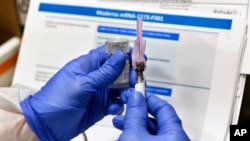A senior World Health Organization official is calling for the equitable distribution of a future COVID-19 vaccine in Africa, warning that the virus will continue to spread if some countries are left behind.
WHO Regional Director for Africa Matshidiso Moeti sees worrying signs that nations in Africa may be among those last in the queue of low-income countries to receive a vaccine against COVID-19.
She notes some high-income countries that are financing the production or research of vaccines are reserving supplies for themselves.
While it is understandable that governments would want to protect their own people, she tells VOA she hopes they are considering the needs of other countries as well.
“We are continuing to analyze how this would work,” said Moeti. "We are continuing to advocate very strongly for this equity principle to be adhered to and respected by everyone and that we all work together to make sure that countries, low-income countries, least developed countries are not disadvantaged when it comes time to having access to a vaccine.”
Moeti warns it would be short-sighted of wealthy countries to think only of themselves. In this interconnected world, she says, no one is safe until everyone is safe, adding a virus knows no borders. She says COVID-19 will continue circulating around the world until everyone is protected from its deadly sting.
She says a vaccine is not a magic bullet and nations must not wait to take action until a safe, effective vaccine is developed—a process that will take many months. In the meantime, she says it is absolutely essential that countries continue to identify cases, trace contacts, isolate them and minimize the spread of the virus.
“Even more importantly, people’s understanding, knowledge and behavior to protect themselves, prevent the virus, prevent themselves spreading to others by wearing masks, by physical distancing whenever it is feasible, by hygiene measures, hand washing, cleaning surfaces in different places are very, very important,” said Moeti.
Moeti notes even when a vaccine is available and affordable, it will take some time to roll it out. Until then, she says, preventive measures must continue.
Latest reports put the number of coronavirus cases in Africa at nearly 1.1 million, including more than 23,000 deaths. Moeti says cases are increasing as the virus moves from high density urban areas to rural areas that have a lower population density and as communities ease up on lockdown restrictions.
She says countries must remain vigilant as curbing COVID-19 is a marathon and not a sprint.
